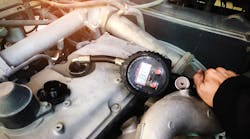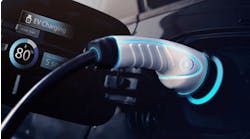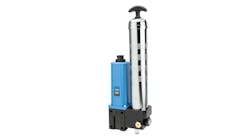Engine oil is the lifeblood of heavy-duty trucks. It protects the internal workings of the engine to help it run efficiently and reliably. Heavy-duty engine oils have evolved to meet the needs of modern fleets and today’s engine technology, but how and why have they changed and what is the future for heavy-duty engine lubricants?
Engine oils in focus
The role of engine oil is important to consider before exploring the advances in modern lubricant technology. High quality lubricants can maintain and improve the efficiency and performance of heavy-duty fleet engines. By minimizing metal-to-metal contact between moving components, as well as reducing pumping and rotational losses, engine oils can improve the engine’s efficiency and fuel economy.
Lubricants also provide vital protection to the internal workings of the engine to prevent wear, which can result in unplanned maintenance and downtime. The right choice of lubricant can help prevent this, saving fleet managers and maintenance teams both time and money.
Modern engine lubricant needs
Heavy-duty trucks and engines have evolved considerably over recent decades. This has consequently driven innovation in engine oil development to ensure that they meet the needs and challenges of modern fleets.
For example, new engines run at higher temperatures, so they need more durable engine oils to help prevent oxidation and wear. The latest engine architecture also features tighter internal clearances and therefore require lower viscosity lubricants that can flow more easily around the engine to provide protection. It is this engine design, combined with the desire across the industry to improve fuel economy and efficiency that has driven the transition towards low viscosity engine oils.
The most recent oil standards, API CK-4 and FA-4, address these challenges by providing greater oxidation resistance along with improved aeration control and shear stability. This results in enhanced engine protection and efficiency and, in turn, improved fuel economy. Added to these key benefits, today’s high performance engine oils also offer the potential to extend oil drain intervals, which can reduce scheduled maintenance costs and help keep fleets on the road for longer between oil drains. Maintaining a vehicle’s warranty is a key consideration when extending drain intervals, so it is therefore crucial to involve the OEM in the process and seek support from expert lubricant technical service advisers. Extending oil drain intervals should always be undertaken in conjunction with an oil analysis program.
The next steps for heavy-duty engine oils
In the near future, it is likely that the industry trend toward lower viscosity engine oils will continue to drive lubricant innovation and achieve even better fuel efficiency for fleets. This can be seen within API CK-4 engine oils and the ongoing transition to their counterpart, API FA-4 lubricants.
By looking to the passenger car industry, we can understand the low viscosity journey that the heavy-duty industry is on. Passenger car engines are becoming more efficient due to legislation and demand for greater fuel economy and lower emissions. This has resulted in lower viscosity engine oils that offer superior protection and maximize engine power output for greater performance. The passenger car industry is several steps and years ahead of the heavy-duty fleet sector, but it is forging a pathway that we will likely follow as we head toward lower viscosity grades such as SAE 0W-20 and SAE 5W-20 lubricants.
Also on the horizon is PC-12, which will be developed based on Phase 3 of the greenhouse gas emissions regulations from the Environmental Protection Agency (EPA) and California Air Resources Board (CARB). An announcement regarding PC-12 has yet to be made, but it is expected to be timetabled for 2027 and to continue the trend toward lower viscosity grades such as SAE 5W-30 and SAE 5W-20.
Heavy-duty engine oils began a journey toward lower viscosities several years ago, and today the industry is continuing on that pathway with engine architecture and technological developments forging the way. PC-12 is beginning to appear on the horizon, and as the roadmap has been marked out by the passenger car industry, it will be here sooner than we think.
Darryl Purificati has 27 years of experience working in the oil and energy sector as a technical advisor. He joined Petro-Canada in 1994 to support its lubricants business and the Petro-Canada Lubricants brand (later acquired by Suncor Energy in 2009) from Ryerson University, where he graduated with a Bachelor of Science (hon) in applied chemistry. In 2017, Petro-Canada Lubricants was acquired by HollyFrontier and is part of the Lubricants and Specialties segment, where Darryl continues to provide technical expertise.
Darryl has successfully undertaken various roles including Lubricants Research and Development, OEM Sales, Fuels Quality, and Technical Services. Since 2012, Darryl’s expertise has been utilized across the industry in his role as industry liaison and technical advisor for OEM and driveline products. Darryl is also widely involved within the industry as an active member of the American Petroleum Institute (API), ASTM International, and the Society of Automobile Engineers (SAE).




